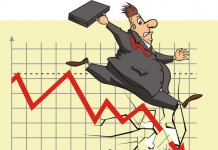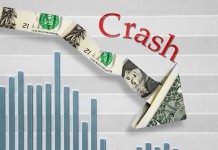A fine time for a Coup.
As I have already mentioned, when I joined my first bank dealing room, I had already been a banker for fifteen years. I had experience of trade finance and the general “methodology” of banking so knew how the “accountancy” side of banking worked. However, despite certain expectations, nothing could have prepared me for the culture shock of not just seeing, but being part of the “money making machine” that a dealing room had become.
 There we around 300 traders in the room; trading FX (spot and forward), deposits, futures, commodities, metals and various derivatives. It could be as quiet as the grave or as noisy as a rock concert. One of my first lessons was to cast off the idea that you always had to at least give the impression that you were busy., as you would in a clerical role.
There we around 300 traders in the room; trading FX (spot and forward), deposits, futures, commodities, metals and various derivatives. It could be as quiet as the grave or as noisy as a rock concert. One of my first lessons was to cast off the idea that you always had to at least give the impression that you were busy., as you would in a clerical role.
Traders were different. They lived by a different set of rules. There was a single expectation placed upon them and that was to make money. They were generally managed by an ex-trader who understood the mentality have “been there and done that”.
My first role was to manage a portfolio of corporate clients of the bank, building a relationship and encouraging them to use us as their prime FX bank.
Quick Change
If something isn’t working in a dealing room or a change is suggested it takes no time to make put it into motion. There are no committees to approve anything, the whole idea is to make money, so change happens very quickly.
One Friday in May 1991, a meeting was held at which we were told of a change that was going to take place that had a significant effect in me. The spot traders were finding that as the number and variety of FX clients grew, they were being side-tracked into quoting (what they considered to be) “minor currencies” in insignificant amounts which detracted from their ability to concentrate on the major books they were assigned to.
In typical fashion the Head of Treasury agreed, and a new desk was formed which I was to be a part of with two colleagues. We were to quote prices to the bank’s customers in all currencies other than the majors (Usd/Dem, Usd/Jpy, Usd/Gbp, Gbp/Dem & Dem/Jpy). This was in the time before the Euro came into being. We also kept a few of the major accounts we talked to as continuity was completely frowned upon and we had each built up decent relationships.
A false sense of security.
The role of the new deal was to be a little defensive. There was plenty of “flow” so we never ran a position simply covering trades in the market as clients asked us for prices. The desk was not designed to quote interbank, so it was a relatively comfortable role. That was until one of the salesmen who was responsible for one of the largest corporate relationships suggested to the client, who was always interested in trading large, market moving amounts, that he may want to trade some minor currencies were the liquidity wasn’t always available and this gave him an opportunity.
This was discussed with the team I belonged to and we agreed that, yes, we were up to the challenge. It all started well, and we were making some good money quoting the likes of Italian Lira, Spanish Pesetas and Dutch Guilders. We always quoted a defensive price and it was agreed that the client would “tell us his side” since he wasn’t trying to take advantage of the bank and saw us as a partner.
All was going well until one morning in August. Liquidity was low as it was the holiday season and there was nothing going on. Of the three guys on the desk, on was on holiday and the other was getting a coffee or using the bathroom. Anyway, the point is I was alone on the desk when I was asked to quote a price in two hundred and fifty million Deutsche Marks versus the French Franc.
How was I to know that at that exact moment, there was a knock on Mikhail Gorbachev’s office door to inform him of a coup?
What happened next was amazing, bizarre and one of the funniest yet terrifying moments of my career.
I will continue this tomorrow.

















